Journey to the heart of the Himalayas on the Tiji Festival Tour and discover the mystical realm of Upper Mustang – Nepal’s Last Forbidden Kingdom. Witness the sacred three-day Tiji Festival in the ancient walled city of Lo Manthang, where vibrant masked dances and age-old rituals bring Tibetan Buddhist legends to life. This is more than a trip—it’s a rare journey through dramatic Himalayan landscapes, remote villages, and centuries-old monasteries in one of the world’s most restricted and culturally rich regions.
|
Mountain Trek / Mustang / Nepal Upper Mustang Tiji Masked Dance Festival TripNext tentative Date: Available as a Private Trek on a date of your preference.
Embark on an epic Upper Mustang overland journey during Yartung Festival, where ancient Tibetan culture meets high-altitude adventure—witness thrilling horse races, vibrant monastery rituals, and festive celebrations in the mystical walled city of Lo Manthang, all while traversing Nepal’s breathtaking trans-Himalayan landscapes. |
Overview
About Yartung Festival
Tiji, short for “Tenpa Chirim,” meaning “the hope of Buddha’s doctrine prevailing in all worlds,” is a deeply significant Tibetan Buddhist festival celebrated in Lo Manthang, Upper Mustang. Rooted in the myth of Dorje Jono, a deity who defeats his demon father to save the kingdom from destruction, the festival symbolizes the triumph of good over evil and the restoration of balance.
Celebrated over three days, Tiji involves sacred Cham dances performed by monks in elaborate costumes and masks at the royal courtyard. The rituals include prayers, chants, and symbolic reenactments of the myth, attracting villagers from across Mustang who gather to receive blessings, socialize, and honor their cultural heritage.
Highlights
| Tiji Festival Celebrations: Experience three days of vibrant festivities and sacred masked dances in the ancient courtyards of Lo Manthang, deep in Nepal’s Last Forbidden Kingdom. | |
| Scenic Overland Adventure: Drive through the breathtaking Kali Gandaki Gorge, high-altitude deserts, and dramatic cliffs in Nepal’s trans-Himalayan rain-shadow region. | |
| Ancient Tibetan Culture: Explore centuries-old monasteries, chortens, and the medieval walled city of Lo Manthang, once a forbidden kingdom. | |
| Unique Landscapes & Hidden Caves: Discover Mustang’s striking red-rock cliffs, hidden sky caves, and vast windswept plateaus that feel like another world. | |
| Authentic Himalayan Experience: Stay in traditional teahouses, savor local Tibetan-influenced cuisine, and immerse yourself in the unique traditions of the Mustang people. | |
| Comfortable Stays in Unique Lodges: Enjoy a blend of comfort and tradition, staying in some of the most unique and welcoming lodges, including some run by local monarchs, offering an authentic yet comfortable experience. |
Best time to go
JanFebMarAprMayJunJulAugSepOctNovDec
JanFebMarAprMayJun
JulAugSepOctNovDec
Spring is one of the best times for the Upper Mustang Trek. The weather is pleasant, and the region is in full bloom with colorful flowers. The daytime temperatures are mild, ranging between 10°C to 20°C (50°F to 68°F), and the nights can be cool but not excessively cold.
The monsoon season in Upper Mustang experiences less rainfall compared to other regions in Nepal. However, there might still be occasional showers. The landscape becomes greener, and the temperature remains moderate during this time. The average daytime temperature ranges from 15°C to 25°C (59°F to 77°F). The otherwise whitewashed landscapes become colorful with shades of pink, yellow, and green fields. Getting to the region, however, is a big challenge as the roads are obstructed due to floods, landslides, and rockfalls. The chances of flight cancellation between Pokhara and Jomsom are also high.
Fall is another excellent time for the Upper Mustang Trek. The weather is stable, and the skies are clear, offering stunning views of the Himalayas. The temperatures are moderate during the day, ranging between 10°C to 20°C (50°F to 68°F), and it gets colder at night.
Winter in Upper Mustang is cold, especially at higher elevations. The temperatures can drop below freezing, and there may be occasional snowfall. The trek is still possible in early winter, but you need to be well-prepared for the cold weather. High passes will be inaccessible due to snow. The average daytime temperature ranges between 5°C to 15°C (41°F to 59°F).
| Group Size | Price per person* |
| 2 -3 pax | USD 3200 |
| 4 pax | USD 2800 |
| 5 pax | USD 2950 |
| 6 - 10 pax | USD 2775 |
|
|
|
|
|
Valid until Dec 31st, 2025
Expat discount is USD 75 on KTM-PKR flights Note: If we go for simpler but comfortable lodges in Kowang (1 night), Ghami (1 night) and Lomanthang (5 nights), the price per person will be: 2 pax- USD 2500 3 pax- USD 2300 4 pax- 2050 5 pax- 2250 6 pax & above- USD 2050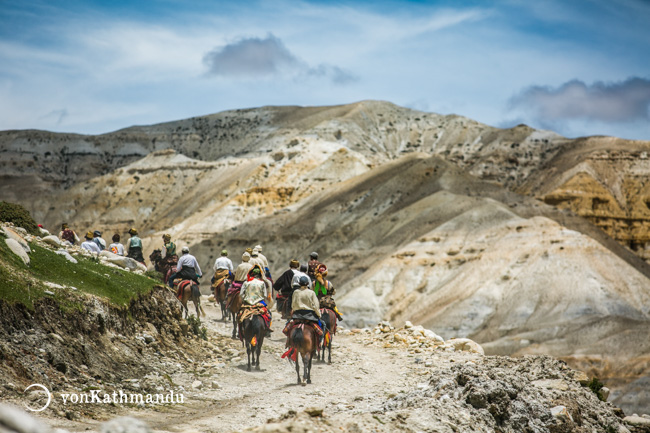
Horsemen galloping from Lo Manthang to Chhoser in Upper Mustang
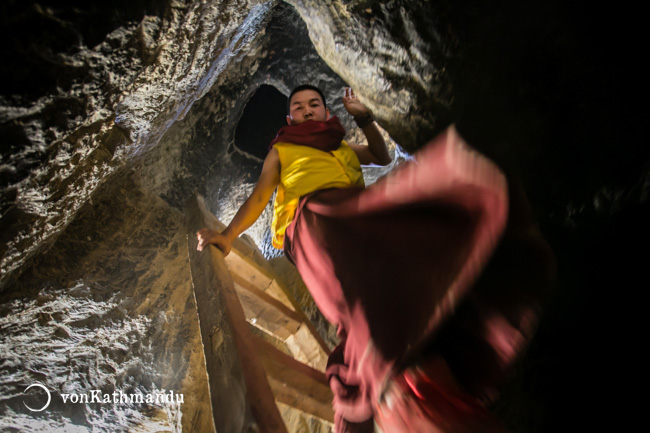
A monk navigates intricate passage of multistorey caves of Chhoser
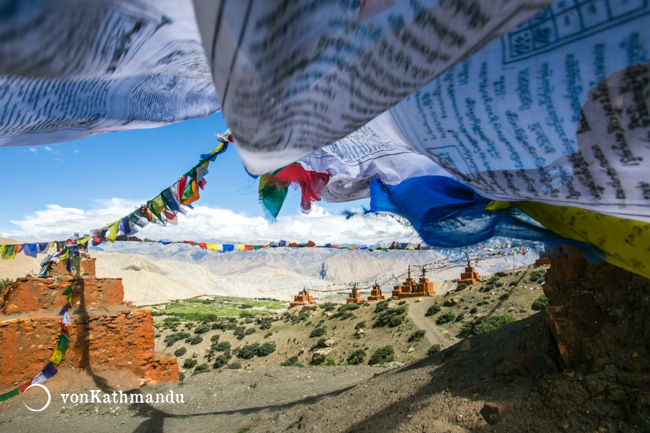
Chhortens and prayer flags, called Lungtas, near Ghar Gompa
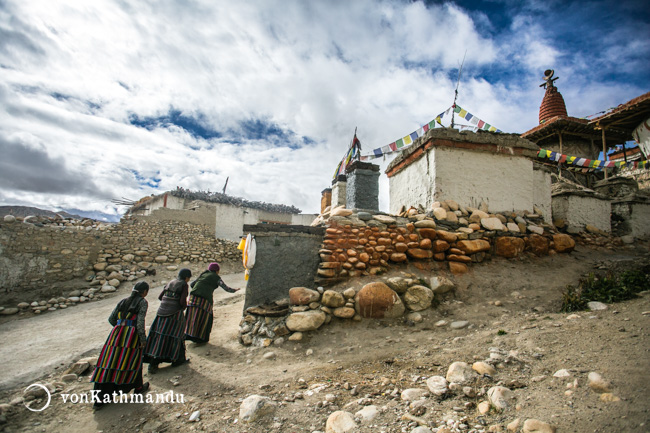
Women walking in clockwise direction around the walled fortress of Lo Manthan. This ritual is called Kora, and performed daily by many locals here.
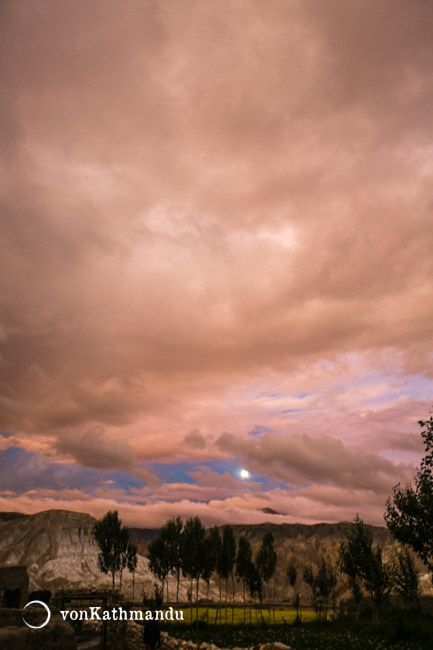
Skies turn pink at dusk
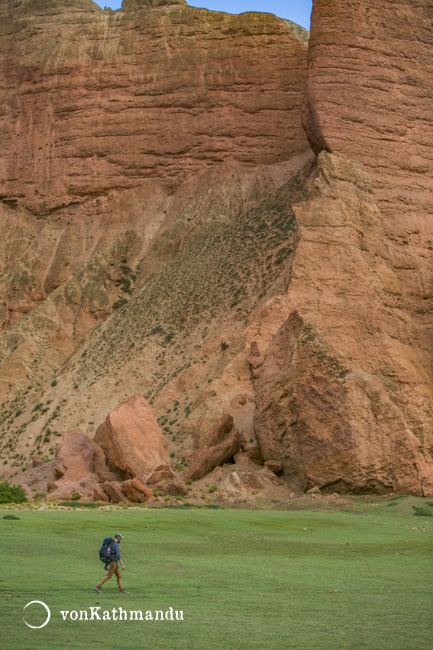
Distinct red cliffs of Dhakmar
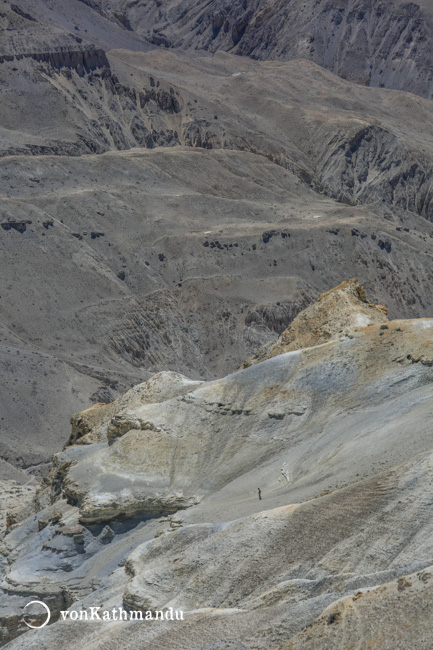
Trekker on the downhilll to Dhi
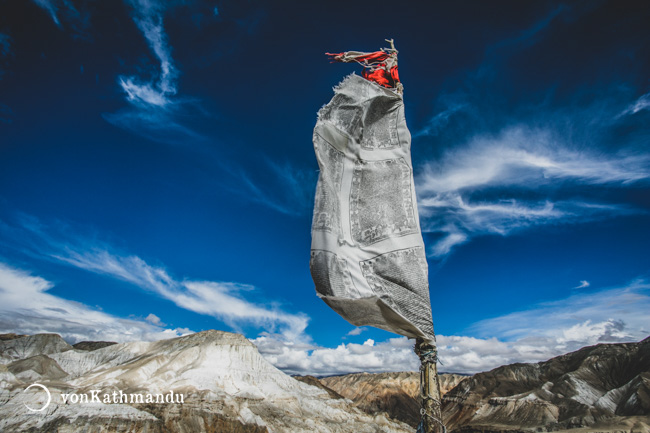
Prayer Flag in Mustang
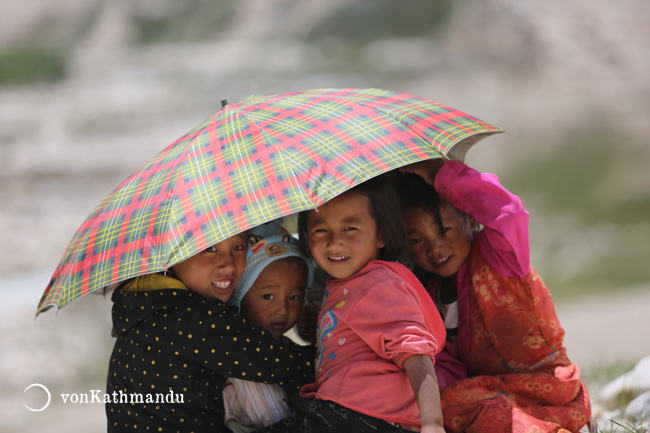
Kids in Lo Manthang
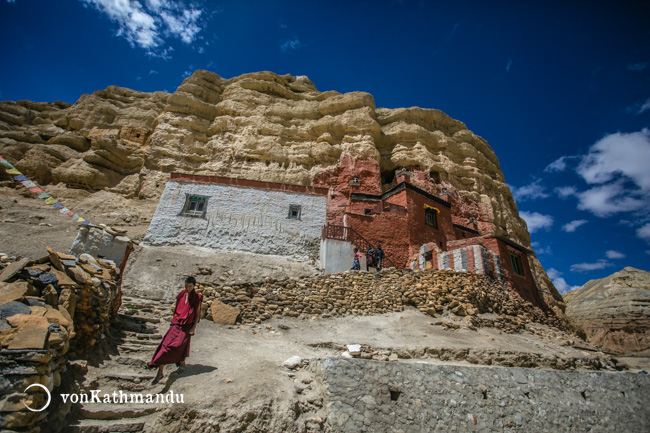
Sun Cave Monastery in Chhoser
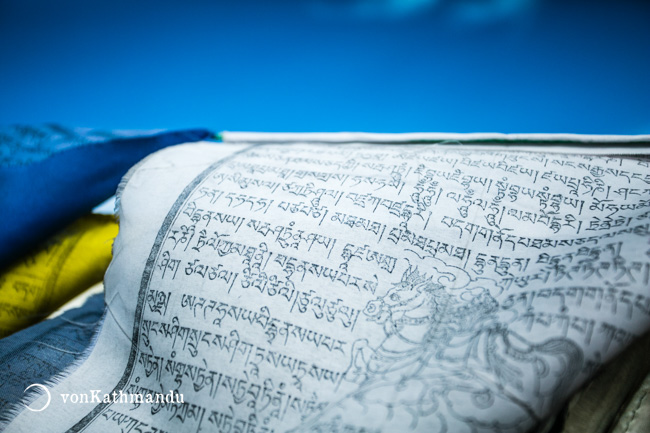
Prayer flags are hung outdoors so that winds can carry the inscribed prayers to all sentient beings
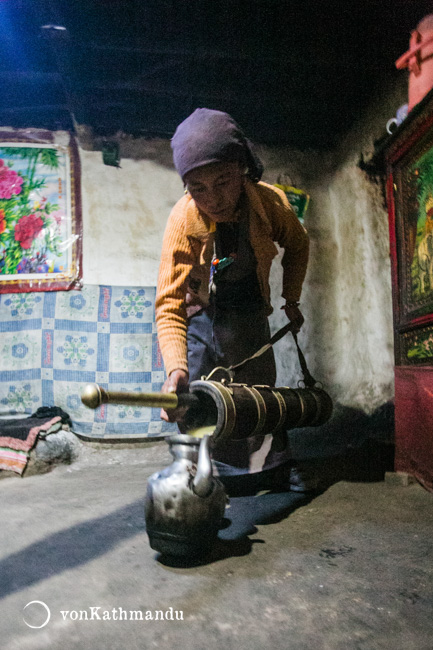
Butter tea is drink of favor in Mustang, and takes a little getting used to
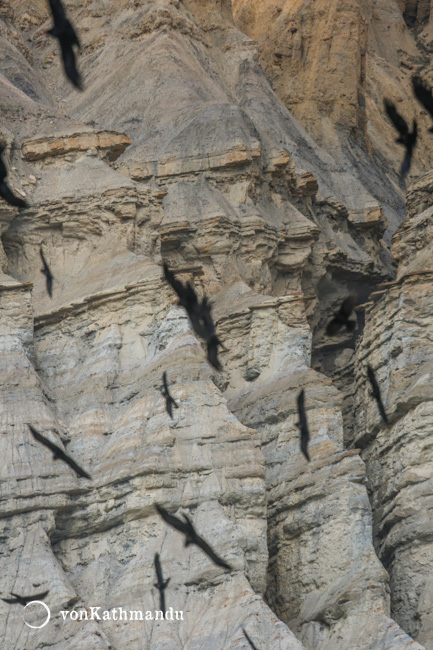
Ravens fly in hordes against the erroded cliffs of Mustang
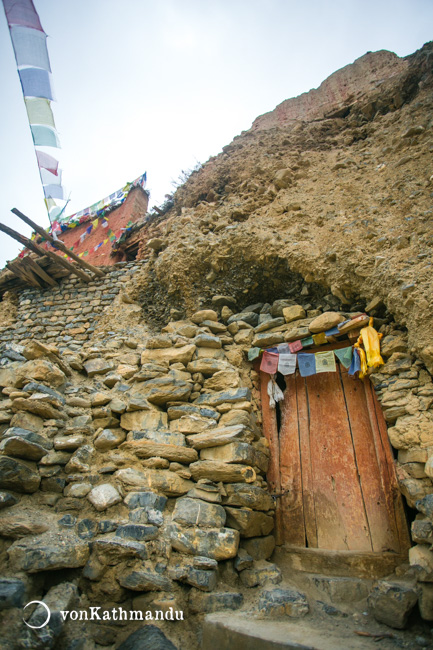
Luri Gompa
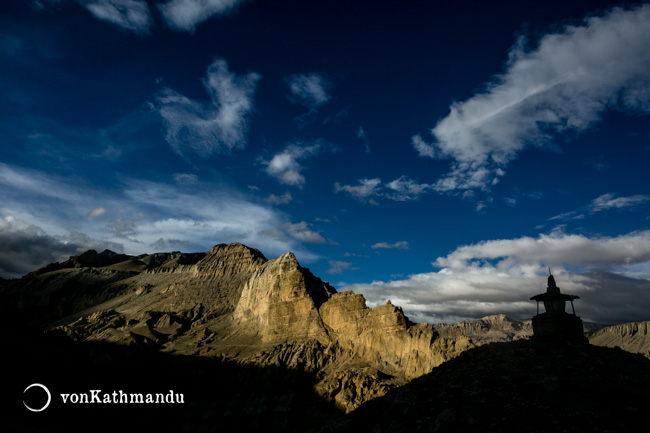
Chhorten in Tsarang at dusk
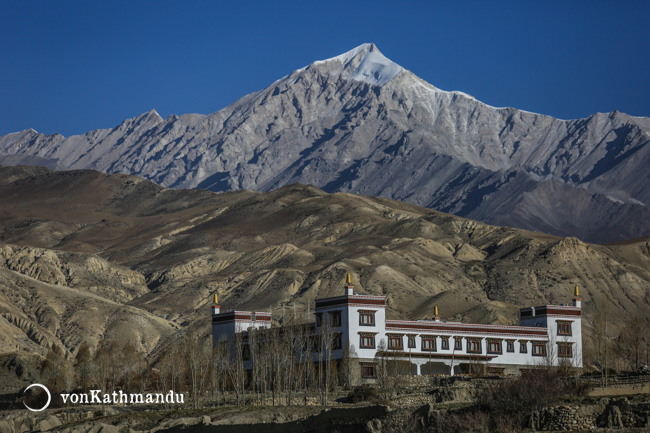
Monastery in Namgyal, just off Lo Manthang, and mountains that separate Mustang and Dolpo
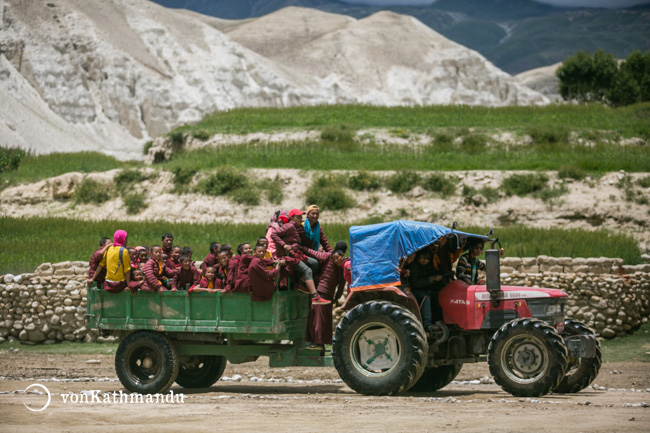
Hitching a ride on a tractor to the revered Chhoser village
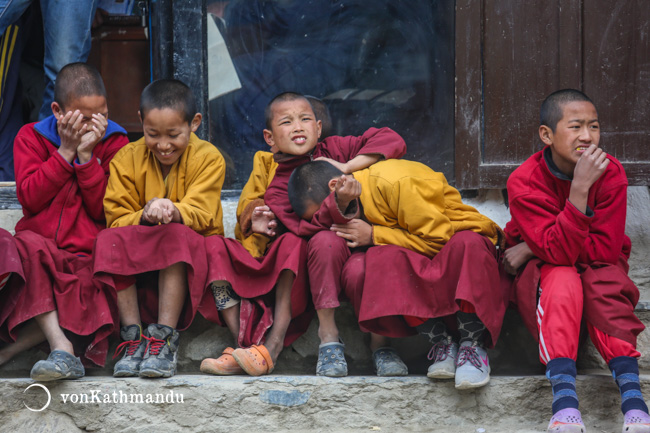
Monks in Mustang
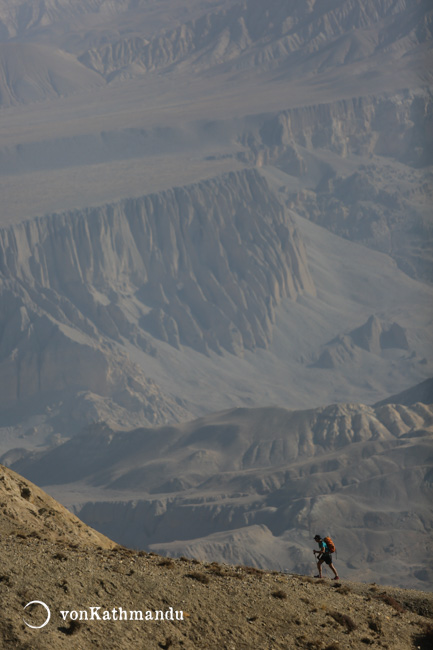
Walking up to Paa Pass, the highest point of the trek
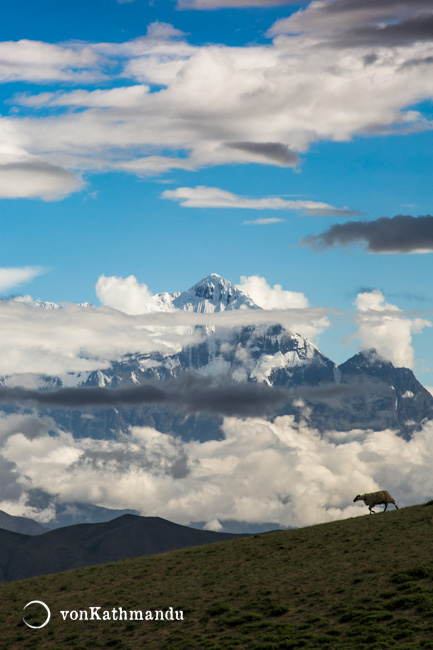
A lone sheep heads back from higher pastures to Dhakmar as dusk approaches
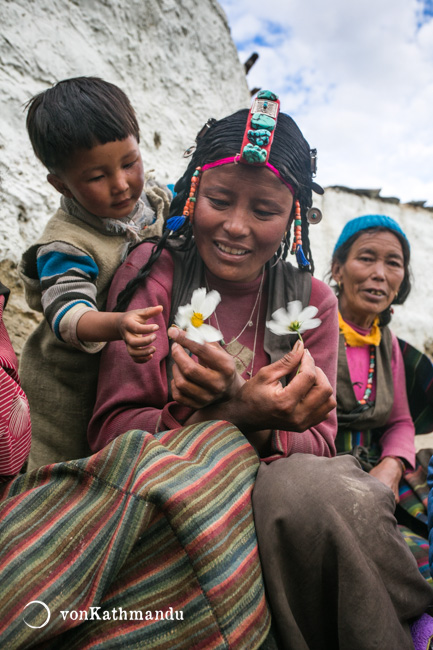
Clad in traditional Tibetan clothes in Samzong
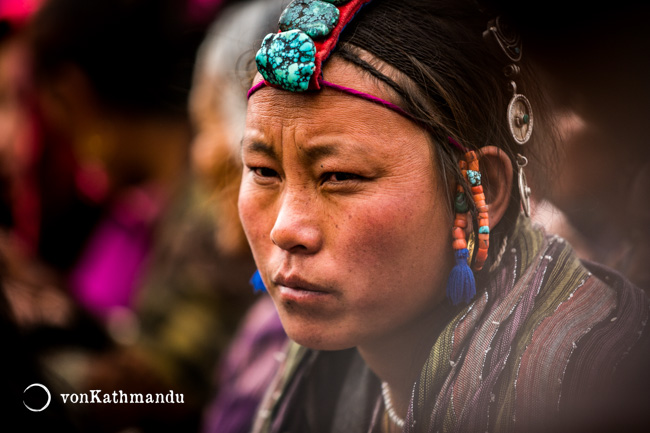
A local Mustangi woman in traditional ornaments
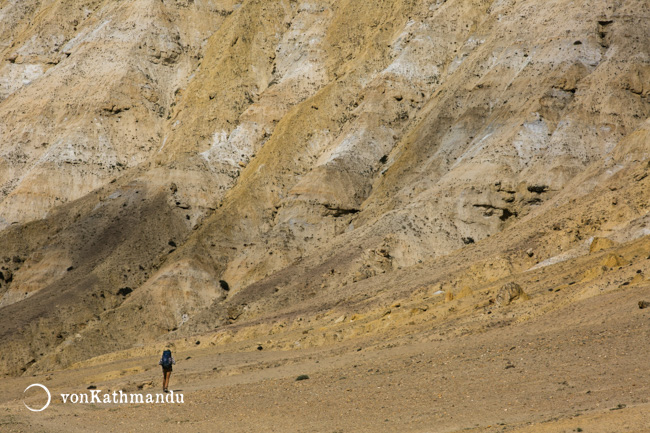
Trekker walks by erratic formations in Upper Mustang
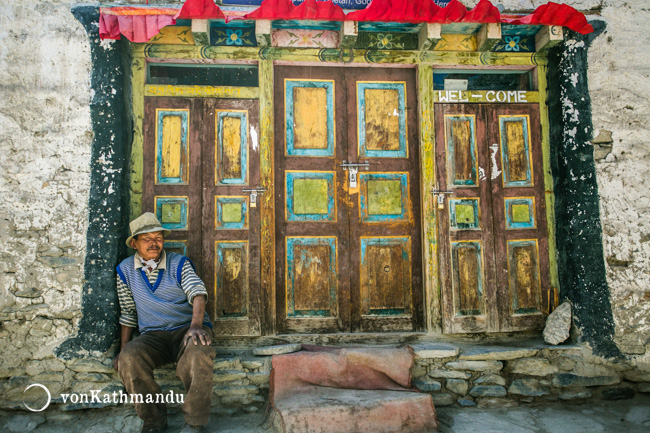
A local in front of his shop in Lo Manthang
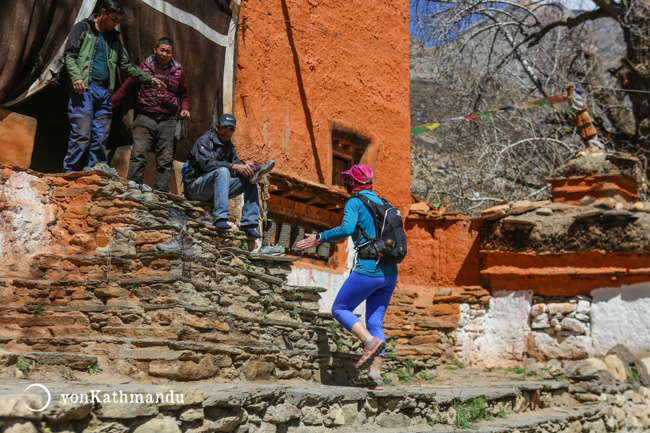
Entrance of Ghar Goampa, the oldest monastery of Upper Mustang
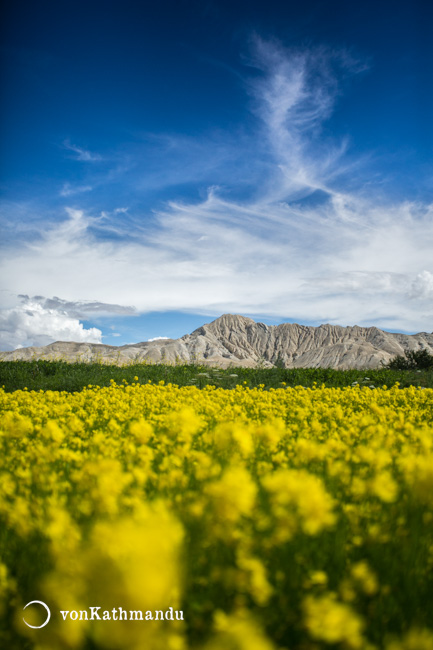
Mustard fields and arid mountains in Upper Mustang
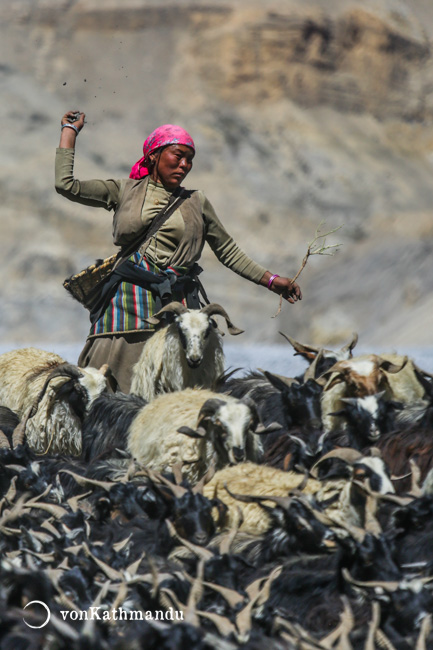
Sheep Herder in the village of Dhe
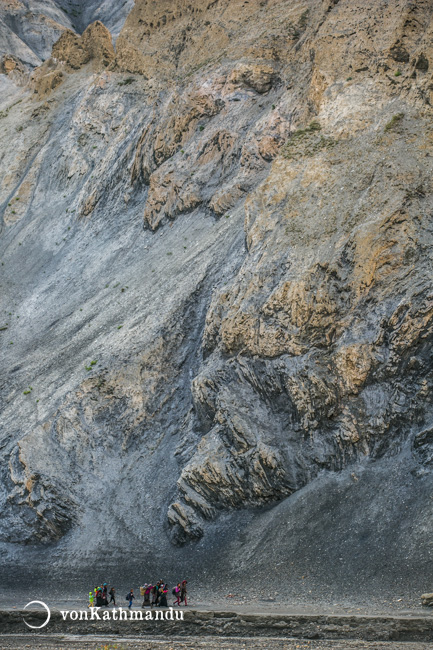
Rock formations and colors are otherworldly in Mustang
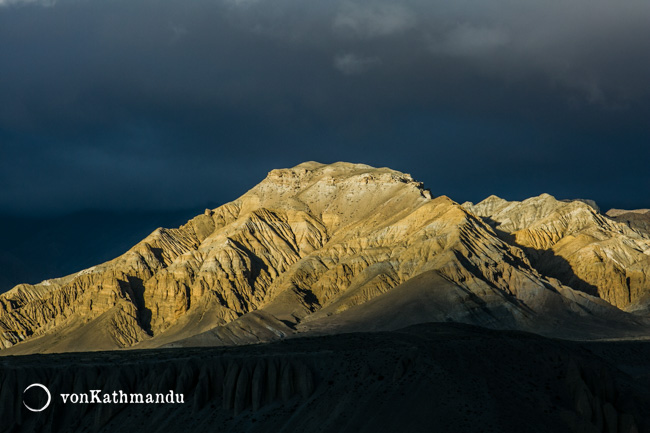
Sunset over the dunes of Tsarang
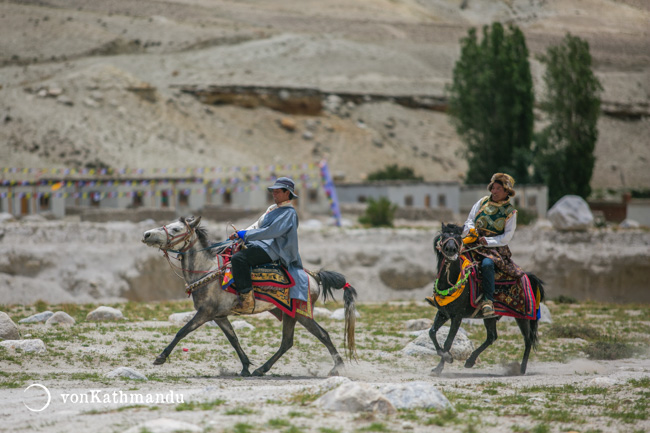
Off to a religious ceremony in Chhoser. On the background is the newly built Nenyul village that will house relocated people of Samzong village
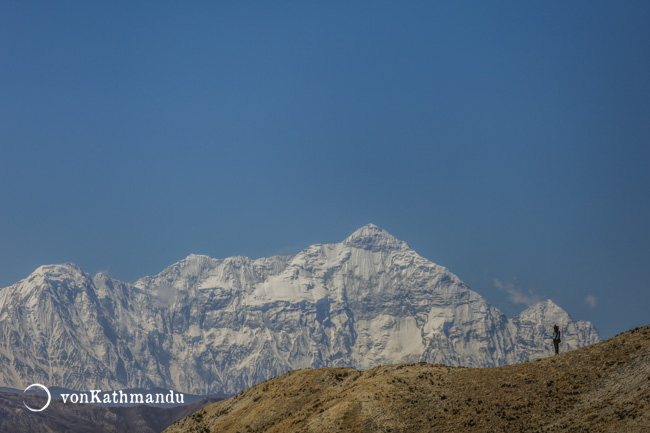
Nilgiri mountain dominates the horizon in Upper Mustang trek
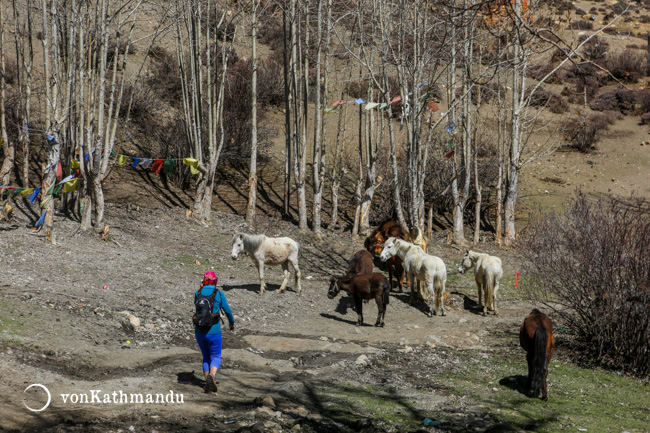
Horses in Mustang have a respectable reputation for their strength
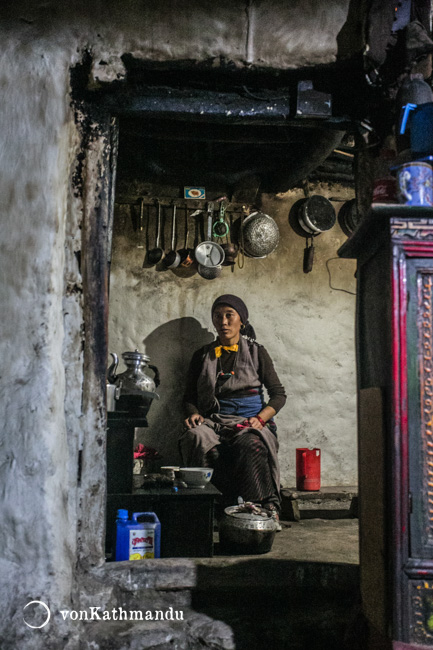
A lady in Samzong
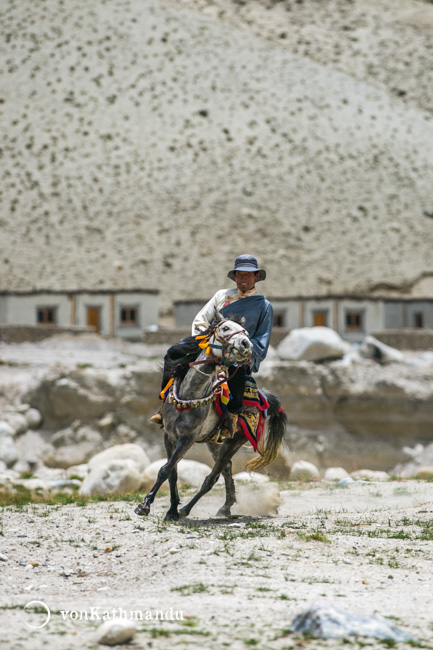
Horseman in Lo Manthang
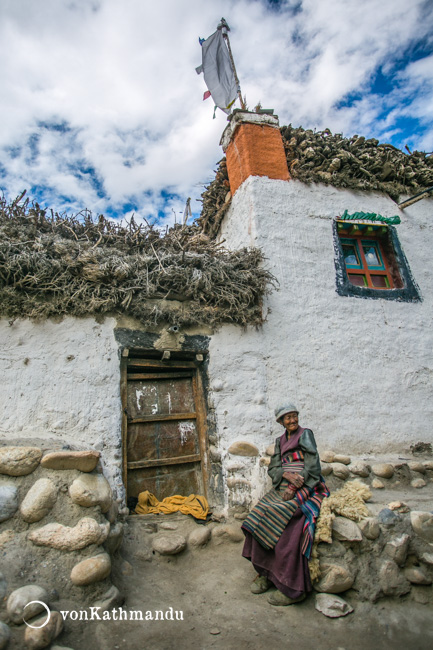
Elderly lady in Dhi village
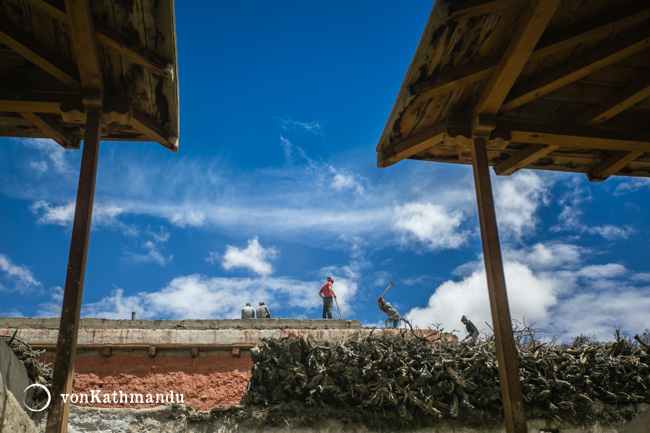
Monastery under construction in Lo Mantang, Mustang
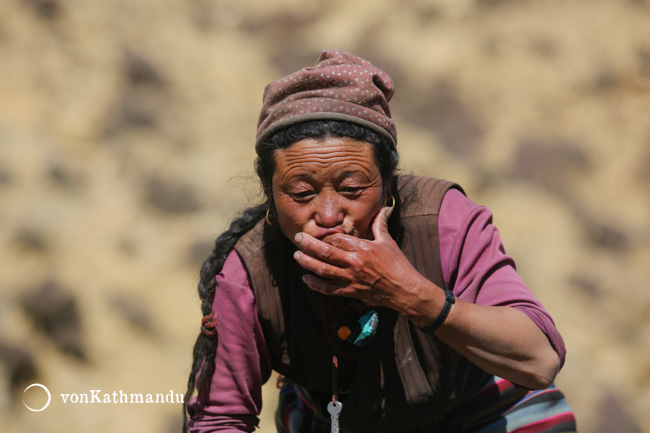
A local brushes her teeth
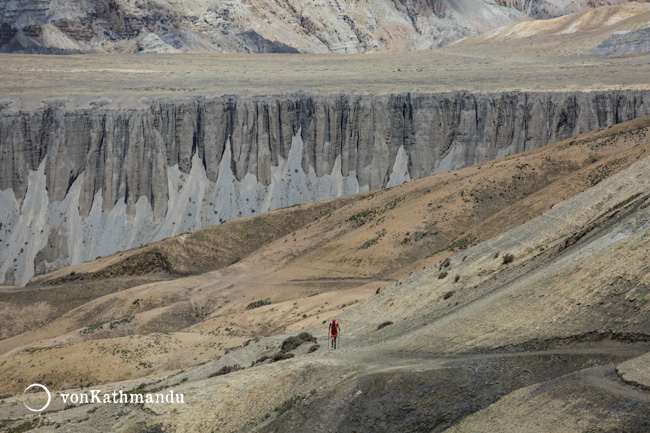
Towards Tangge from Yara
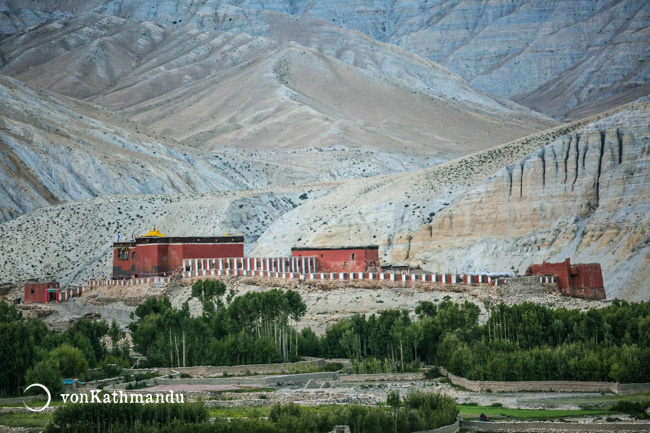
Monastery in Tsarang
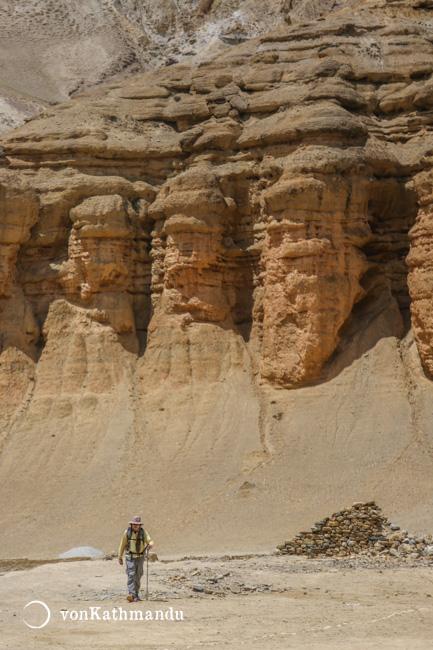
Eroded by air and water, the landscape of Mustang is Martian and unique to say the least
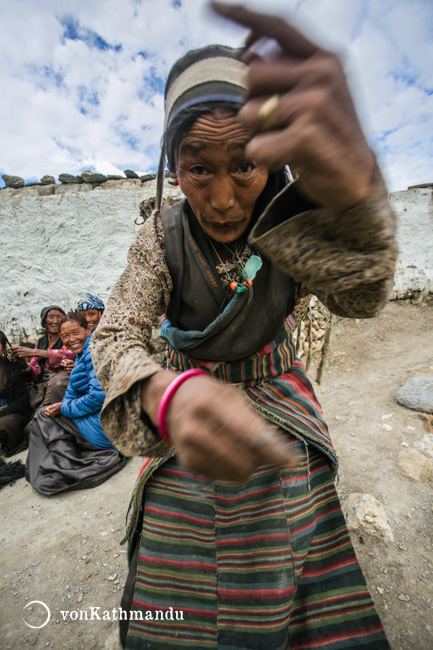
A local in Samzong dances for the camera
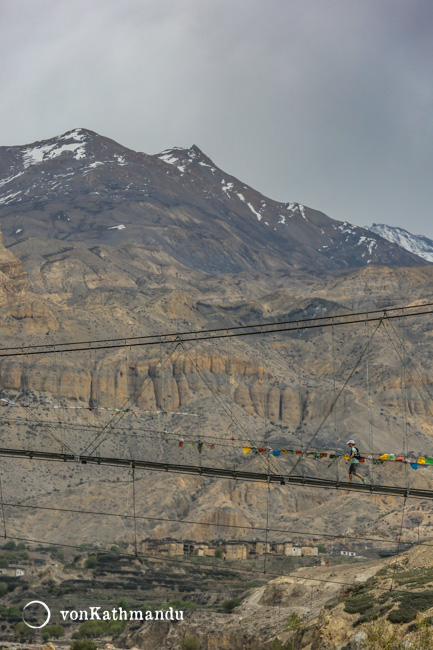
Suspension bridge in Chhuksang
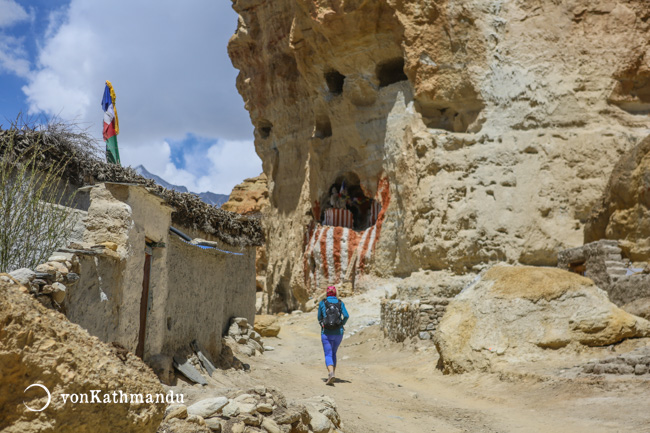
Mustang is home to caves believed to be thousands of years old
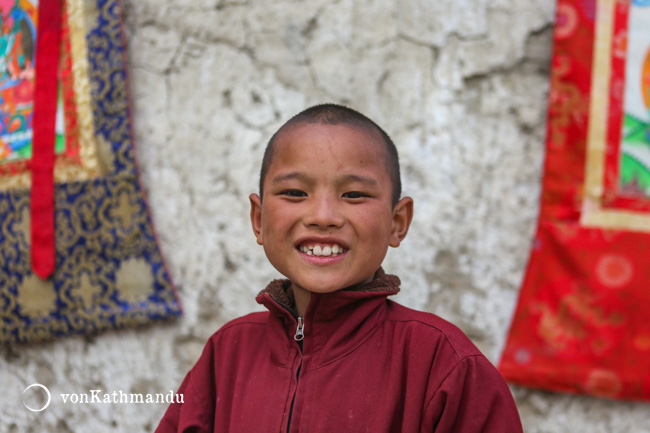
Little monk within the walled ancient city of Lo Manthang
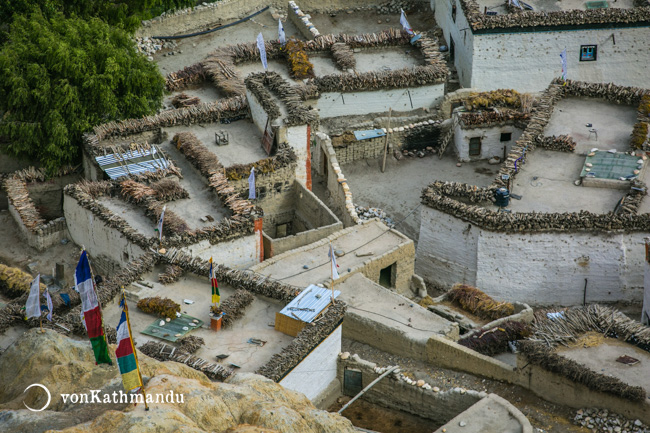
Dhe rooftops
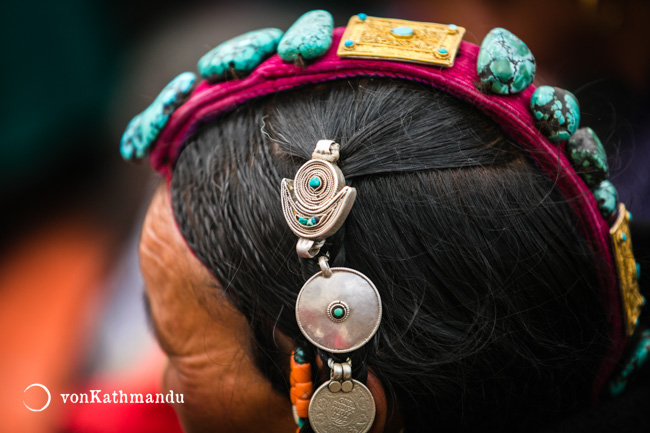
Tibetan ornaments worn by a local at a festival
Itinerary
|
Day 1 May 20 (Tue) |
Kathmandu - Pokhara - Kowang |
|
|
Day 2 May 21 (Wed) |
Kowang - Kagbeni |
|
|
Day 3 May 22 (Thu) |
Kagbeni - Muktinath - Ghami |
|
|
Day 4 May 23 (Fri) |
Ghami - Ghar Gompa - Lomanthang |
|
|
Day 5 May 24 (Sat) |
Lomanthang - Samzong - Lomanthang |
|
|
Day 6 May 25 (Sun) |
Lomanthang (Yarthung festival) |
|
|
Day 7 May 26 (Mon) |
Lomanthang (Yarthung festival) |
|
|
Day 8 May 27 (Tue) |
Lomanthang (Yarthung festival) |
|
|
Day 9 May 28 (Wed) |
Lomanthang - Konchokling - Choser |
|
|
Day 10 May 29 (Mon) |
Choser - Dhi - Yara |
|
|
Day 11 May 30 (Tue) |
Yara - Kagbeni |
|
|
Day 12 May 31 (Wed) |
Kagbeni - Pokhara |
|
|
Day 13 June 1 (Thu) |
Pokhara - Kathmandu |
|
|
Day 1 May 20 (Tue) |
Kathmandu - Pokhara - Kowang |
|
|
Fly from Kathmandu to Pokhara 25 mins |
|
|
Drive from Pokhara to Kowang 4 to 5 hrs |
Meals Included: Dinner
Accommodation: Lodge Thasang Village
|
Day 2 May 21 (Wed) |
Kowang - Kagbeni |
|
|
Drive from Kowang to Kagbeni via Marpha and Dhumba lake 3 to 4 hrs |
Meals Included: Breakfast, Dinner
Accommodation: Red House Lodge
|
Day 3 May 22 (Thu) |
Kagbeni - Muktinath - Ghami |
|
|
Acclimatization drive from Kagbeni to Muktinath 2 to 3 hrs |
|
|
Drive from Muktinath to Ghami 3 to 3.5 hrs |
Meals Included: Breakfast, Dinner
Accommodation: Hotel Royal Mustang
|
Day 4 May 23 (Fri) |
Ghami - Ghar Gompa - Lomanthang |
|
|
Drive to Dhakmar 1 hr |
|
|
Hike up to Ghar Gompa via Dhakmar cliffs Ghar Gompa is he oldest and most prominent monastery of Upper Mustang. |
|
|
Drive to Lomanthang |
Meals Included: Breakfast, Dinner
Accommodation: Royal Mustang Resort
|
Day 5 May 24 (Sat) |
Lomanthang - Samzong - Lomanthang |
|
|
Hike from Lomanthang to Samzong, and back to Lomanthang |
Meals Included: Breakfast, Dinner
Accommodation: Royal Mustang Resort
|
Day 6 May 25 (Sun) |
Lomanthang (Yarthung festival) |
|
|
Explore Lomanthang (Tiji festival) |
Meals Included: Breakfast, Dinner
Accommodation: Royal Mustang Resort
|
Day 7 May 26 (Mon) |
Lomanthang (Yarthung festival) |
|
|
Explore Lomanthang (Tiji festival) |
Meals Included: Breakfast, Dinner
Accommodation: Royal Mustang Resort
|
Day 8 May 27 (Tue) |
Lomanthang (Yarthung festival) |
|
|
Explore Lomanthang (Tiji festival) |
Meals Included: Breakfast, Dinner
Accommodation: Royal Mustang Resort
|
Day 9 May 28 (Wed) |
Lomanthang - Konchokling - Choser |
|
|
Drive from Lomanthang to Konchokling 1 hr |
|
|
Hike up to Konchokling ridge and to Choser 3 to 4 hrs |
Meals Included: Breakfast, Dinner
Accommodation: Mountain Lodge
|
Day 10 May 29 (Mon) |
Choser - Dhi - Yara |
|
|
Drive from Choser to Dhi |
|
|
Hike to Yara and explore Luri Gompa |
Meals Included: Breakfast, Dinner
Accommodation: Mountain Lodge
|
Day 11 May 30 (Tue) |
Yara - Kagbeni |
|
|
Drive from Yara to Kagbeni |
Meals Included: Breakfast, Dinner
Accommodation: Red House Lodge
|
Day 12 May 31 (Wed) |
Kagbeni - Pokhara |
|
|
Drive from Kagbeni to Pokhara |
Meals Included: Breakfast
Accommodation: Temple Tree Resort and Spa
|
Day 13 June 1 (Thu) |
Pokhara - Kathmandu |
|
|
Fly from Pokhara to Kathmandu 25 mins |
Meals Included: Breakfast
Lodge Thasang Village |
X Close Accommodation Popup
X Close Popup
Kowang
Room Amenities
| • | Free Wi-Fi | • | Room Service | • | Private Bathroom | • | Hot Shower | • | Free Toiletries | • | Towels | • | Slippers | • | Power Socket | • | Daily Housekeeping |
Property Amenities
| • | Restaurant and Bar | • | Garden | • | Laundry | • | Outdoor Seating | • | Mountain Views |
Red House Lodge |
X Close Accommodation Popup
X Close Popup
Kagbeni, Mustang, Nepal
Room Amenities
| • | Free Wi-Fi | • | Room Service | • | Private Bathroom | • | Hot Shower | • | Free Toiletries | • | Towels | • | Slippers | • | Power Socket | • | Daily Housekeeping |
Property Amenities
| • | Restaurant and Bar | • | Garden | • | Laundry | • | Outdoor Seating | • | Mountain Views |
Hotel Royal Mustang |
X Close Accommodation Popup
X Close Popup
Ghami, Upper Mustang, Nepal
Room Amenities
| • | Free Wi-Fi | • | Room Service | • | Private Bathroom | • | Hot Shower | • | Free Toiletries | • | Towels | • | Slippers | • | Power Socket | • | Daily Housekeeping |
Property Amenities
| • | Restaurant and Bar | • | Garden | • | Laundry | • | Outdoor Seating | • | Mountain Views |
Royal Mustang Resort |
X Close Accommodation Popup
X Close Popup
Lomanthang, Upper Mustang, Nepal
Room Amenities
| • | Free Wi-Fi | • | Room Service | • | Private Bathroom | • | Hot Shower | • | Free Toiletries | • | Towels | • | Slippers | • | Power Socket | • | Daily Housekeeping |
Property Amenities
| • | Restaurant and Bar | • | Garden | • | Laundry | • | Outdoor Seating | • | Mountain Views |
Royal Mustang Resort |
X Close Accommodation Popup
X Close Popup
Lomanthang, Upper Mustang, Nepal
Room Amenities
| • | Free Wi-Fi | • | Room Service | • | Private Bathroom | • | Hot Shower | • | Free Toiletries | • | Towels | • | Slippers | • | Power Socket | • | Daily Housekeeping |
Property Amenities
| • | Restaurant and Bar | • | Garden | • | Laundry | • | Outdoor Seating | • | Mountain Views |
Royal Mustang Resort |
X Close Accommodation Popup
X Close Popup
Lomanthang, Upper Mustang, Nepal
Room Amenities
| • | Free Wi-Fi | • | Room Service | • | Private Bathroom | • | Hot Shower | • | Free Toiletries | • | Towels | • | Slippers | • | Power Socket | • | Daily Housekeeping |
Property Amenities
| • | Restaurant and Bar | • | Garden | • | Laundry | • | Outdoor Seating | • | Mountain Views |
Royal Mustang Resort |
X Close Accommodation Popup
X Close Popup
Lomanthang, Upper Mustang, Nepal
Room Amenities
| • | Free Wi-Fi | • | Room Service | • | Private Bathroom | • | Hot Shower | • | Free Toiletries | • | Towels | • | Slippers | • | Power Socket | • | Daily Housekeeping |
Property Amenities
| • | Restaurant and Bar | • | Garden | • | Laundry | • | Outdoor Seating | • | Mountain Views |
Royal Mustang Resort |
X Close Accommodation Popup
X Close Popup
Lomanthang, Upper Mustang, Nepal
Room Amenities
| • | Free Wi-Fi | • | Room Service | • | Private Bathroom | • | Hot Shower | • | Free Toiletries | • | Towels | • | Slippers | • | Power Socket | • | Daily Housekeeping |
Property Amenities
| • | Restaurant and Bar | • | Garden | • | Laundry | • | Outdoor Seating | • | Mountain Views |
Mountain Lodge |
X Close Accommodation Popup
X Close Popup
Mountain lodges are the basic accommodation set up by locals to cater to trekkers in the trails. The common features across all lodges are standard rooms, a spacious and heated dining hall, and a restaurant with a menu. The rooms in mountain lodges generally have two or three twin beds with a mattress and blanket. If you are used to sleeping warm, we highly recommend bringing your own sleeping bag and liner. Other amenities could be a table, hanger, and dustbin but do not expect to have charging ports and attached toilets in the rooms. Moreover, it is mandatory to have meals in the facility you’re staying at.
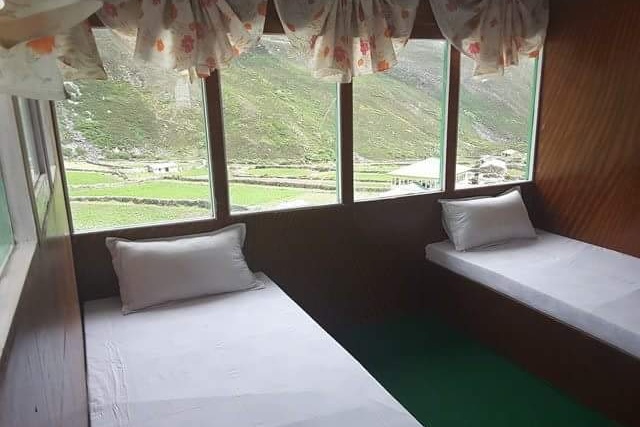
Room Amenities
| • | Shared Toilet |
Property Amenities
| • | Restaurant and Bar | • | Outdoor Seating | • | Mountain Views |
Mountain Lodge |
X Close Accommodation Popup
X Close Popup
Mountain lodges are the basic accommodation set up by locals to cater to trekkers in the trails. The common features across all lodges are standard rooms, a spacious and heated dining hall, and a restaurant with a menu. The rooms in mountain lodges generally have two or three twin beds with a mattress and blanket. If you are used to sleeping warm, we highly recommend bringing your own sleeping bag and liner. Other amenities could be a table, hanger, and dustbin but do not expect to have charging ports and attached toilets in the rooms. Moreover, it is mandatory to have meals in the facility you’re staying at.

Room Amenities
| • | Shared Toilet |
Property Amenities
| • | Restaurant and Bar | • | Outdoor Seating | • | Mountain Views |
Red House Lodge |
X Close Accommodation Popup
X Close Popup
Kagbeni, Mustang, Nepal
Room Amenities
| • | Free Wi-Fi | • | Room Service | • | Private Bathroom | • | Hot Shower | • | Free Toiletries | • | Towels | • | Slippers | • | Power Socket | • | Daily Housekeeping |
Property Amenities
| • | Restaurant and Bar | • | Garden | • | Laundry | • | Outdoor Seating | • | Mountain Views |
Temple Tree Resort and Spa |
X Close Accommodation Popup
X Close Popup
Lakeside, Pokhara
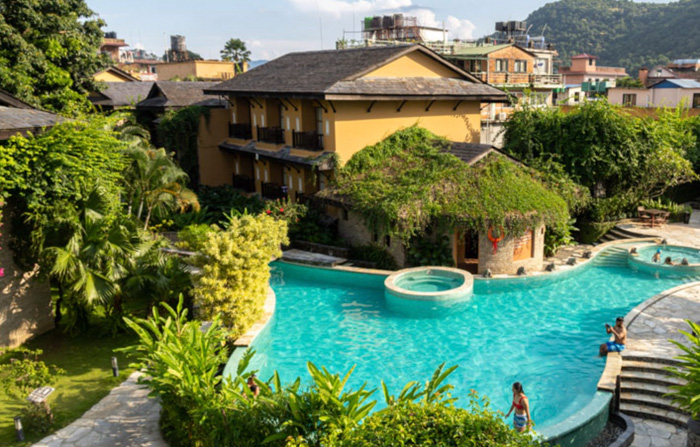
Room Amenities
| • | Free Wi-Fi | • | Room Service | • | Air Conditioning | • | Balcony | • | TV | • | Mini Bar | • | Private Bathroom | • | Hot Shower | • | Free Toiletries | • | Towels | • | Slippers | • | Power Socket | • | Electric Kettle | • | Daily Housekeeping |
Property Amenities
| • | Restaurant and Bar | • | Child-friendly | • | Garden | • | Swimming Pool | • | Plunge Pool | • | Massage | • | Spa | • | Laundry | • | Fire Extinguisher | • | POS Machine | • | Outdoor Seating | • | Mountain Views |
Customize this trip
Take a heli back.
For those short on time or looking to add an exhilarating experience of flying over the majestic Himalayas, you have the option to charter a private helicopter on the way down. Inquire for prices and options!
Kathmandu Hotel and Transfers
-
If you’d like us to organize airport transfers and arrange your stay in Kathmandu or any other cities, let us know. We’re happy to give you options based on your preference, and book them for you.
Here’s one of our popular 2 days add-on: USD 185 per person:
- Airport pick up and drop off, facilitated by an English-speaking representative
- 2 nights in a four-star hotel in Kathmandu (Hotel Shankar or similar) on bed & breakfast plan and twin-sharing basis